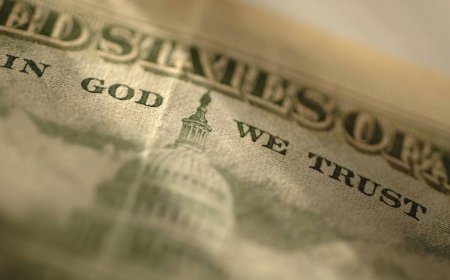Christianity for Sale: False Prophets Charge Money for the Gospel
By capitalizing from the Word of God, church leaders are committing an abomination before God not to mention corrupting the sacredness of His house.

Jesus never charged a dime for teaching the people about the Kingdom of God. In fact, one day Jesus walked into the temple of God and noticed the exchange of goods for money in progress and people selling doves and other commodities from within the church. This obviously angered Him because He at once turned over the tables they used and the seats they sat in; “And he said unto them, It is written, My house shall be called the house of prayer; but ye have made it a den of thieves” (Matt. 21:13).
This message is not difficult to neither understand nor interpret. The church is not for operating business ventures but for worshiping God only. Yet, this did not stop the moneychangers from profiting off the goods of the house of God. The things they sold were necessary for the operation of the sanctuary such as doves and other sacrificial goods and animals—for the offering of sins—and the leaders knew people needed these things for regular sacrifices.
However, this is the equivalent of a car salesman selling the steering wheel and tires only after someone bought the car. Though it was lawful to sell sacrificial goods in the open market, the moneychangers sold them from within and out of the church, which was unethical and a huge mistake.
In today’s society, the only item a believer needs for church worship is a bible, but not according to today’s preachers. Many churches have bookstores that sell bibles and other Christian books, along with the pastor’s past sermons in audio and video format. Some churches sell prayer cloths and trinkets of jewelry, holy water, bible covers, bumper stickers, head coverings, and some clothing. How is this act of selling goods from within and out of the church today different from what the moneychangers were doing then and why should not a believer, as Jesus did, get upset at this display of religious capitalism?
There is no difference and believers should. Yet, preachers will attempt to justify this act with philosophical preliminaries and bible loopholes, such as the actual sells are not taking place inside the sanctuary, but outside in the corridor. This is equal to determining what the definition of sales is.
Selling from within the church is an outright defiance of the message Jesus sent in St. Matthew 21:12, 13, which is that the church of God is sacred and for worshiping God only, not for capitalizing on His words, gifts, and concepts.
False prophets have no fear or consideration for God and His Word because they continue to sell from within the church even today. They are only concerned for themselves and with succeeding in convincing believers that selling and buying in the church is ok, biblically justifiable, and condoned by God. “And through covetousness shall they with feigned words make merchandise of you: whose judgment now of a long time lingereth not, and their damnation slumbereth not.” 2 Peter 2:3.
Believers today will not stand up against such evil and do what Jesus did by turning over the tables and throwing the moneychangers out of the church. If a believer did, the church administration would be instructed to call security or the local police. Afterward, the believer would be regarded as disruptive and 'full of the Devil.' Yet, what Jesus did was not devilish; it was out of a love and respect for His father’s house.
Today, in the lobbies of many of America’s largest churches are display booths of the pastor’s sermons in audio and video format; his recent books and his wife’s books, and registration forms for the costly up-coming conference. There are enrollment forms for the church bible college, day care, aerobics class, gym membership, and many other so-called church ministries supposedly ordained of God, and neither of these amenities are not without price.
A full-fledged bookstore within the church sells collections of audio and videotape series of other renowned preachers, costing from five to $300 and for the religious bureaucrats and likely voters there is a voter registration booth. These type enterprises are growing faster in America’s churches and considered acceptable, but where is the money going?
According to false prophets, the money is to continue the work of God. The truth is they need money to pay church administration, advertising cost, marketing cost, and building mortgages. So, not only have preachers managed ways of earning from and capitalizing off the concepts and goods of God, but they must now act as Chief Executive Officers (CEOs), expert entrepreneurs, and tax collectors (or tithe collectors) for the church body.
Therefore, enforcing the deed of tithing has become a biblical form of a RIRS (Religious Internal Revenue Service). To maintain this new religious form of capitalism, preachers must teach believers how to receive and manage the money they supposedly receive as blessings from God. As a result, the actual purpose of the gospel goes out the windows of the church and the prosperity doctrine begins to seep in.
Soon, spiritually deprived, yet prosperous Christians, who have an abundance of material possessions, make up the church congregation. They know nothing about faith, love, or righteousness, but they are wise in receiving material blessings from God: Now, people only come to church for prosperity. Thus, the mentality Jesus spoke of in St. John 6:26 is fulfilled, which says “. . . Ye seek me, not because ye saw the miracles, but because ye did eat of the loaves, and were filled.”
The church today reaps the fruit of the American economy, as many other businesses and people are doing. America is a nation based on the economic theory of capitalism, which springs from production, growth, value, and distribution of goods and or services run by private owned businesses. Large businesses invest the profits from these goods to make more products and to continue the cycle of production, growth, value, and distribution.
It is a mathematical pattern of gaining wealth from the labors of others, and only few, or even one person, actually benefit from this cycle. Whoever invents the product and introduces it into the mainstream market earns the most profit and this is what preachers are doing when they produce and market sermons in the form of a product—audio and video tapes—and as a service, organized conferences and Christian retreats, charging for their knowledge of God.
Churches emulate large corporations today and are far from the way the early church was set up, though not because of technological advancement, but because of secularity. No more is today’s Christianity a Savior/believer relationship, but a business/consumer relationship. Churches are legally employing workers and are now the creators of jobs in the community as corporations are.
Any preacher whose church is providing jobs in the community is now a positive influence in society, and the church should be, but what about influencing society with the gospel, is the community being saved or only employed? To remain prominent in the community and among society, the church must stay in good standing with the government, from whom they have received recognition as tax-free agents of society.
They submit to the government’s regulation of the 501c3 status, which exempts churches from paying taxes and allows donors, who do good deeds for the community and supposedly for God, to give to the church tax-free donations. In return for a tax-free status, the church partakes in political activities (although not openly or legally) by inviting politicians to the church and accepting tax-free donations in return for votes.
This is the reason that many churches have set up voter registration booths in the church lobby. To stay prosperous and to continue successful operation in the community the church must submit to the government, and the pastor does not want to risk the church’s prosperity.
If church leaders truly want to prosper and be notable and prominent leaders in the community, instead of selling the concepts of God they should start their own businesses, independently of the church. They would secure prosperity by serving the community and not by draining members for tithes or conforming to the secular ways of society.
It would be more acceptable to God if churches served the community and the secular world as servants of Christ and at the same time grow in the spiritual aspect of the gospel, separate from the physical, secular aspect.
For instance, the church administration could devise a plan to organize a corporation legally aside from the church operation and build a plant to manufacture a commodity. They could produce and sell a Christian line of clothing or some other needful product instead of producing and selling biblical theories, which are naturally free.
They could begin a chain of restaurants or maybe erect subdivisions of residential housing or apartment complexes. They could open a few grocery stores within inner-city communities, low-income day cares or affordable Charter schools. So long as the business ventures they operate is away (in miles and theory) from the church mission. Church worship service, (and worship service only) would be at the church.
There must be absolutely no selling or distributing from the church. If preachers are so-called wise men of God, then they should put their minds to work for the community and society and not just for themselves alone. These business ventures would not be a part of the gospel of Christ but a contribution to society. They could then employ not only church members, but other citizens of society also.
If selling the words of God and tax-tithing the people of God to death is the only means by which church leaders can make a living, then they are truly poor stewards of God, and not very creative. By capitalizing from the Word of God, church leaders are committing an abomination before God not to mention corrupting the sacredness of His house.
Preachers and Profits
By selling audio and videotaped sermons, preachers have begun the dumbing-down of Christians by stealing from them that which is vital for their understanding of God, which is reading and studying the Bible. In destroying the believer's desire to learn, preachers have taken on the Lordship of God by teaching their own interpretation of the Scriptures.
They condense their understanding of God and sell it for a profit. As stated earlier, preachers are not furthering the work of God but capitalizing from it. Do not get the two confused; this is not God’s will for salvation. Money is not a means to an end for the work of God, faith is.
As the technology age grows, and the convenience of in-home entertainment increases, there will soon come a time when leaving the home will be unnecessary. And with the rise of audio and video sells of the messages of God, more people will stop attending the actual church worship altogether.
Preachers who capitalize on the age of technology concerning church ministries are not leaving room for the power of God to gather, but the power of convenience. They attempt to make it much easier and quicker to know God instead of learning of Him through the sufferings of life. They construct do-it-yourself, fast-food ways of feeding the people of God. They offer high-priced videotape offers of television sermons, which usually appear on cable paid television stations. They conduct convention center conferences, which are only accessible by way of owning a car and having ready a cover charge: by doing these things, placing price tags on religious goods and services, not only are churches financially separating themselves from the poor, but they are separating themselves physically also.
The larger the church, the farther out into the suburbs they move. The time will come when the gospel will only benefit those who are socially and financially accustom to the middle-class lifestyle. Those who are of the lower-income level and who cannot afford the luxuries of cable television, or who have not a computer with access to the Internet, who do not own a car so to commute to the suburbs, will not have the advantage of hearing the messages of these worldly false prophets.
Ironically, though, maybe that day will be a good one for the poor of this earth because the Lord will then send to them a true prophet of God who will deliver His message without price nor reward, and those who receive His message will know the true God and the power of His Word.
Preachers know that believers will not take the time to sincerely read the Bible and they take advantage of this by tampering with scriptures adding felonious lies in their own interpretations. They know that this is the age of technology, which gives them even more reason to create technological forms of sermons and lessons.
They also know that this is the age of entertainment and that show biz is another way to reach people and disrupt their thoughts. Increasingly, preachers are resorting to antics of Christianity, such as “pulpit skits” and theatrics to amuse and win followers. They perform dramatic sermons in the pulpit, and if they are not falsifying the powers of God, they are dramatizing them. They have props on stage and use dancers, Christian rock singers and rappers, and musicians to reach the populous of the masses.
They have even resorted to reality television shows to entice unlearned minds. It has become trendy to act according to the world to gain the world, but preachers do not know when to return to the gospel. They go out in the world and recruit thousands of people but neglect to enforce the gospel once they gain these followers. The plans have backfired and they have succumbed to the world instead of the world converting to the church.
Drama gets peoples’ emotions going, as well as song, theatrics, and other forms of religious entertainment. When large congregations gather, the hype draws potential believers into the theatrics of false preachers, and they forget about what is real in the gospel. While snared in the net of emotion, the preacher could say anything he wanted to and the congregation would agree with an Amen.
One woman preacher, during the hype and emotion of the congregation shouted, “Praise God in the flesh, come on, praise him in the flesh.” She, nor did anyone in the crowd, realize what she was saying. Although it may seem a small matter as to what she was saying, the impact of what she said was dangerous. If a crowd of believers began to worship God in the flesh, then God is not there because God is a Spirit and true worshipers worship God in Spirit and in truth, but these so-called believers were hyped to no reasonable understanding.
Another method of deception preachers use to get the devotion of followers is to invite a group of believers overseas to walk in the footsteps of Jesus. They gather thirty-to-forty believers, each contributing three to four thousand dollars apiece for the trip and then go over to Jerusalem to worship Jesus.
The Jerusalem trip is supposed to give the believer a closer sense of the life of Jesus, adding to them spiritually, maybe strengthening them to fight for the kingdom. These preachers pay no attention to the scripture that reads “Woman, believe me, the hour cometh, when ye shall neither in this mountain, nor yet at Jerusalem, worship the Father . . . But the hour cometh, and now is, when the true worshippers shall worship the Father in spirit and in truth” (John 4:21, 23).
It does not matter where the believer goes to worship God, for He is the same everywhere. So long as Jesus gives the Holy Ghost, nowhere on earth can be more powerful or fulfilling than where the believer is when they receive the Holy Ghost. This too, going overseas to worship the Lord, is nothing more than a money-raising scheme. A trip to Jerusalem might be a nice encouraging trip, but the motive behind some preacher’s reasoning makes the trip questionable. Some preachers return to the States and sell supposed holy oil that comes “straight from the Holy Land” for five to ten dollars a bottle.
The marketing of Christianity is also becoming prevalent in today’s church. When preachers advertise their conferences and up-coming events, they try to make it dramatic and as promising as possible. They swear that the power and anointing of God will be there at the conference to deliver the believer from whatever problem they are encountering. They promise deliverance, breakthroughs, and breaking of yokes, and never neglect to promise the ever-popular material blessing, whatever it may be.
The Lord does indeed break yokes and remove burdens, He also heals the body and frees the mind, and many times, He does it at the gatherings of large congregations. The problem comes when the preachers who hold these conferences charge admission then sell the videotaped version of the conference to those who may have missed it.
One preacher had advertising time on the radio for his upcoming event. God may have come and delivered many people, but the method in which the preacher used to advertise was suspect. He used a man with a British accent to speak in the commercial. It was a prosperity conference and people are more apt to believe in the accent of a supposed social elite like an Englishmen.
This may seem far-fetched, but it was the strategy of the preacher; after he researched marketing techniques. On that same radio station, there was an advertisement for an expensive foreign automobile; it too, used a man with a British accent to sell its product. People associate the British with class and style and this is the message the advertisers of the foreign automobile wanted to portray. This is also the message the preacher intended to portray when he advertised for his prosperity conference. Advertising like this is deception in the marketing world and in the Christian.
This same preacher was speaking to his congregation on television and told them about an evening he and his daughter spent at the opera and how he taught her to wave like a princess, one of class and style. Then he boasted of the classic luxury car he owned and how his daughter wanted French fries from a fast-food restaurant, then how he felt strange driving into a fast-food restaurant in this type of classic car.
The congregation loved and admired his flattering words, which made him glow in the light of arrogance. This mentality is what the Bible calls “the pride of life” and it is an evil mentality. What this preacher is doing is setting a false standard for the believers as to what is a successful life in God. Now, from this message, people will think it is ok for them to seek after expensive cars, an opera lifestyle, and the class status of the Euro-lifestyle.
The preacher poisoned his sermon with the deception of riches, status, and classism. The class status mentality involves family lifestyle, which involves competition. Various communities throughout the nation base acceptance on affordability and credibility, which is dependent on career, educational, and social status.
Notable preachers live in notable neighborhoods among the social elite: while church members live in decent, well-to-do neighborhoods, but many live in the inner cities. In either case, people are trying to maintain an acceptable lifestyle according to what society demands.
Sometimes people find this success in God, if they approach Him correctly, and others find it by simple hard work. But when the average family in the average neighborhood, living the average lifestyle begin budgeting their money by including church tithes as a monthly expense, the simplicity of Christ is lost.
Excerpt from Contender: A Defense Against False Prophets and Doctrine















































